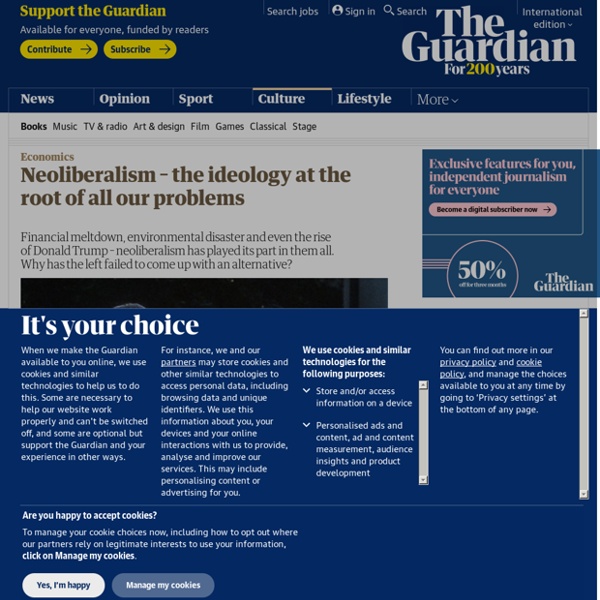Neoliberalism – the ideology at the root of all our problems

https://www.theguardian.com/books/2016/apr/15/neoliberalism-ideology-problem-george-monbiot
Related: YH2
• What means neoliberalism
• pkotro
• COVID
CorpWatch : What is Neoliberalism?
"Neo-liberalism" is a set of economic policies that have become widespread during the last 25 years or so. Although the word is rarely heard in the United States, you can clearly see the effects of neo-liberalism here as the rich grow richer and the poor grow poorer. "Liberalism" can refer to political, economic, or even religious ideas. In the U.S. political liberalism has been a strategy to prevent social conflict. It is presented to poor and working people as progressive compared to conservative or Rightwing. Economic liberalism is different.
Le miracle et le monstre – un regard sociologique sur le Coronavirus
Oui, nous pouvons arrêter, le monde. Et c’est même c’est très facile. Voilà le miracle que semble accomplir le Coronavirus. Mais c’est nous, et non le virus, qui l’avons fait !
The President of Belgian Magistrates: Neoliberalism is a form of Fascism
Neoliberalism is a species of fascism By Manuela Cadelli, President of the Magistrates’ Union of Belgium The time for rhetorical reservations is over. Things have to be called by their name to make it possible for a co-ordinated democratic reaction to be initiated, above all in the public services. Liberalism was a doctrine derived from the philosophy of Enlightenment, at once political and economic, which aimed at imposing on the state the necessary distance for ensuring respect for liberties and the coming of democratic emancipation.
A Brief Examination of Neoliberalism and Its Consequences - Sociology Lens
Starting in the second half of the 20th century, neoliberalism became increasingly prominent as a form of governance in countries around the world (Peters 2001). Originally, the roots of neoliberalism were planted by a classical political economy theory which advocated for markets (and thus people) to be completely liberated from any type of governmental interference (Smith 2009). “Free” competition and “free” enterprise were promoted as manners in which economies should be allowed to grow. Martinez and García (2000) contend that this “liberal” type of economic theory began to be adopted in the West throughout the 1800s and into the early part of the 1900s. The Great Depression of the 1930s and the development of Keynesian economics, though, temporarily slowed down the advancement of liberal economics. At the national-level, neoliberal ideas have drastically changed how states operate.
The Cracks Begin To Show in The UK Economy (1/2)
Bio John Weeks is a professor emeritus of the University of London's School of Oriental and African Studies and author of Economics of the 1%: How Mainstream Economics Serves the Rich, Obscures Reality and Distorts Policy. His recent policy work includes a supplemental unemployment program for the European Union and advising the central banks of Argentina and Zambia. Ozlem Onaran is Professor of Economics at the University of Greenwich in the U.K.
Ménage à Trois
The Strange Non-Death of Neoliberalism. Colin Crouch urges us to rethink the role of giant corporations in the state vs market analysis of neoliberalism Neoliberalism has ruled the Western world and most of the globe since the 1970’s. It is based on a market-driven approach to monetary policy and it promotes control of the economy by the private sector, which is supposedly more efficient than the public sector.
Timeline: Barclays' widening Libor-fixing scandal
6 February 2013Last updated at 11:51 Libor, the London inter-bank lending rate, is considered to be one of the most crucial interest rates in finance. It underpins trillions of pounds worth of loans and financial contracts. So, when Barclays was fined £290m in June last year after some of its derivatives traders were found to have attempted to rig this key rate, already weak public confidence in banks was harmed further. The scandal led to the resignation of both Barclays chief executive Bob Diamond and chairman Marcus Agius. Here are some of the key dates in the scandal:
The Strange Non-Death of Neoliberalism, by Colin Crouch
An Economist examines the puzzling and tenacious hold of Neo-Liberalism on the public mind It all began, perhaps unfairly, with Austrian economist Friedrich von Hayek | Photo: Wikicommons Rewriting Reality: Colin Crouch on Neo-Liberalism
Related:



